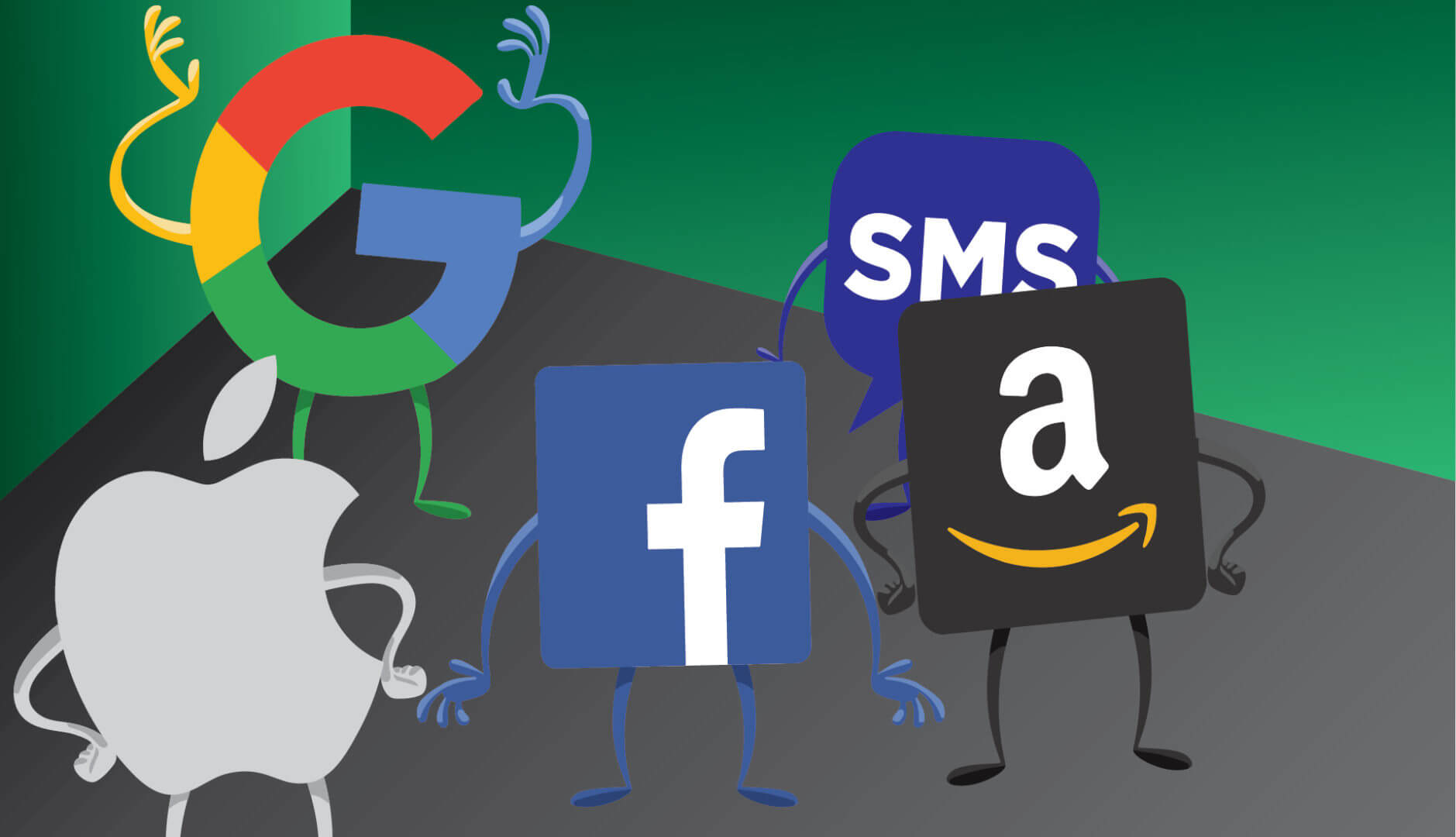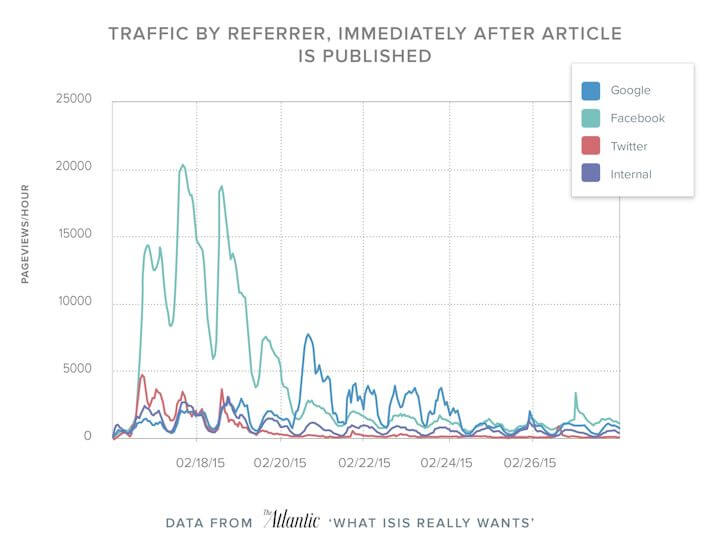Competitive threats to Google, and what they mean for you
If the majority of your digital marketing is aimed at boosting your rankings on Google search results, contributor Eric Enge contends you might want to rethink your priorities.

Google market share in the US currently stands at 63.8 percent, with Bing (including Yahoo’s search volume) coming in at 33.5 percent, according to January 2016 comScore data. This makes Bing a credible competitor to Google in the US, but the story is quite different internationally, where Google is dominant in nearly every country, other than China (Baidu), Russia (Yandex), Korea (Naver) and the Czech Republic (Seznam).
Google is the big dog in traditional search, but it would be wrong to think that is the end of the story, as Google faces competition on many different fronts.
In today’s post, I review Google’s “other competitors” to illustrate how this shapes Google’s view of the world and how this view impacts your digital marketing strategy.
What business is Google in?
First, though, let’s establish some context by discussing what business Google is in. Most of us think of Google as a “search engine,” and we tend to think of that as a website where you go to a search box and enter a search query. For some of us, the definition has evolved to include using voice search commands to execute a search.
However, if you look at Google’s About page, here is the famous quote that anyone who follows the world of search has seen many times: “Google’s mission is to organize the world’s information and make it universally accessible and useful.”
This suggests that the search engines themselves hold a somewhat broader view of what they do — one that isn’t tied to a search box, or even the use of search commands in one given application.
This is a topic that I’ve discussed many times with Bing’s Senior Strategy Director, Stefan Weitz, over the years, and he has repeatedly told me how search functionality is something that will be embedded into everything, rather than being something that you access by going to a special place (like a website). In other words, search functionality will be distributed everywhere.
Now let’s broaden that to think about it from a user perspective. What do users want? They want a way to get what they’re searching for. That’s it. As you will see during the course of today’s post, users have many different ways to do that today.
Amazon vs. Google
Amazon may not be the first company you think of as a competitor to Google, but that’s not the way Google sees it. In Berlin in 2014, Google’s Executive Chairman, Eric Schmidt, had this to say: “Many people think our main competition is Bing or Yahoo. But really, our biggest search competitor is Amazon.” The main area of competition for these two companies is product searches.
The New York Times sourced data on the market share for product search as follows:
Forrester Research found that a third of online users started their product searches on Amazon, compared to 13 percent who started their search from a traditional search site. ComScore found that product searches on Amazon have grown 73 percent over the last year, while shopping searches on Google have been flat.
In some specific markets, Amazon share is even higher, according to a report in The Week, which said that as of October 2015, “Amazon accounts for over 40 percent of book sales, and over 60 percent of online sales.”
So when it comes to the product shopping space, Google is in second place and struggling to catch up.
Apple vs. Google
Eric Schmidt has cited other competition along the way. For example, in an interview with Bloomberg, he indicated that the competition with Apple is the “defining fight of the computer industry.”
From a numbers perspective, it may not always look that way, as “Android currently holds around 84.7 percent of the market, compared to Apple’s 11.7 percent. Windows Phone 8, BlackBerry OS and other operators make up around 3.6 percent,” according to a report that appeared when Schmidt made that statement. From this viewpoint, Apple may not seem like a huge threat to Google, but you can’t ignore the pressure that Apple places on Google via its constant push toward innovation.
Then there is Apple’s support for ad blocking in iOS 9. Ad blockers arguably improve the user experience, especially on mobile devices, as they block content from loading. These happen to block ads from Google’s DoubleClick for Publishers and Google’s DoubleClick Ad Exchange, the web’s largest ad exchange. These are direct assaults on Google’s revenue.
The worrisome part of ad blockers to me is that publishers need a way to monetize the content they produce; otherwise, they’ll no longer be able to create great content. Will ad blocking kill the web? Probably not entirely, but it could change web publishing in fundamental ways, and it could drive a major shift toward native advertising.
Of course, both Apple and Facebook have built publishing platforms (Apple News Articles and Facebook Instant Articles) where content can be published on their proprietary platform, and content published on these wouldn’t be subject to ad blocking. Hence, content creators may focus more and more of their energy in these areas and start relying less and less on the traditional web for their income.
Facebook vs. Google
Facebook is widely accepted as a major competitor to Google. From a mobile ad market share perspective, Facebook and Google combined make up more than 50 percent of the overall market, according to an eMarketer report from last year, with Google getting the largest portion, at about 33 percent, and Facebook at 19 percent. At that level, they may not seem like direct competitors. But the competitive picture is much broader than that.
For example, when it comes to driving traffic to a website as part of a news cycle, Facebook is king. The following data from Chartbeat shows Facebook dwarfing Google as a referrer of traffic to The Atlantic for its news story, “What ISIS Really Wants.”
This data is supported by a 2015 study performed by Parse.ly which showed that “the social network passed Google as the leading source of referral traffic in June and in July extended its lead to three percentage points, 38.2 percent to 35.2 percent.” Note that this study was focused on Parse.ly clients, which consist of many news sites, including Fox News, Telegraph Media Group, Mashable, Business Insider, Condé Nast, The Atlantic and Reuters.
Then there is the world of apps. Recent comScore data suggests that users spend 44 percent of all their digital media time in apps.
That’s an incredible move away from the web, and it reflects the fact that apps can often offer a far better experience online than websites can (particularly if you view mobile website development as the practice of taking a desktop site and crushing it down into a smaller form factor).
Both Facebook and Google have seen this coming, as you can see in the following graphic:

(Chart via Atlas, Data from comScore)
The top six apps — and eight of the top nine — are from Facebook and Google. This looks like a solid head-to-head fight, but it’s one where Facebook has the lead. Having an app installed isn’t the only metric that matters — usage level matters a lot, too. To illustrate, of those that have the Facebook app installed, a full 48 percent consider it their number one app.
In addition, WhatsApp hit 1 billion users as of February 2016, and Facebook Messenger reached 800 million users as of January 2016. These numbers are well beyond where they were at the time comScore compiled the data in the prior chart, so Facebook’s share here is growing fast.
In addition, as I’ll discuss in the next section, asking your friends for advice remains the single most trusted source of information for users, and doing that is easier than it has ever been in human history.
Messaging/texting vs. Google
In September of 2015, Nielsen published data that showed that 83 percent of online respondents in 60 countries say they trust the recommendations of friends and family. Second place? That was advertising on branded websites, which came in at 70 percent. That’s a big gap.
So just how prevalent is text messaging overall? Teckst.com collected some stats from numerous sources that shows the mind-blowing truth of the matter:
- According to Pew Internet, texting is the most widely used and frequently used app on a smartphone, with 97 percent of Americans using it at least once a day.
- According to Portio Research, people worldwide will send 8.3 trillion text messages in this year alone. That’s almost 23 billion messages per day, or almost 16 million messages per minute.
- Per Forrester, more than 6 billion SMS text messages are sent in the US each day.
- Data from Mobile Marketing Watch shows that SMS text messages have a 98 percent average open rate, while email has only a 20 percent average open rate.
- Per Connect Mogul, the average person responds to a text message in 90 seconds, compared to 90 minutes for an email, and 90 percent of all text messages are read within three minutes of their delivery.
What this means is that one of the most severe forms of competition for Google is people simply asking their friends. The trust level is very high, and the response time is fast. If the search engine doesn’t provide good results, or it gets too laden with ads, well, there’s an easy alternative!
Competition and its impact
Google remains the dominant search box worldwide, but that isn’t its greatest challenge. Most market dominant players aren’t toppled due to being beaten at their own game — they’re beaten by changes in the rules of the game. This is where the challenges for Google lie. Messaging/texting, Google, Amazon and Apple are all posing real challenges to Google.
So yes, if Google provides a not-so-great answer in its SERPs, a searcher might go to Bing, but there are also many other places where users might go to get their answer. This creates an enormous amount of pressure on Google from a search quality perspective. It also keeps Google from going too far with commercialization of the results.
For marketers, this means that SEO remains an important way to obtain search traffic, but you may also need to consider the other parts of your digital marketing strategy:
- Amazon SEO: Do you have a strategy for scaling your sales on Amazon?
- Native advertising: If web advertising is under assault by ad blockers, what else can you do to promote yourself on the web? Native advertising is likely to be a major beneficiary of this trend.
- Facebook advertising: There is a lot going on within Facebook, and its targeting capabilities are very impressive. This applies to a lesser degree on other social media sites, too.
- Apps: If 44 percent of all digital media time is spent on apps, that means some of your customers are here. Should you develop an app? Some businesses should, but the question also should be, what’s your strategy for showing up within the apps of third parties?
- Branding: Friends usually make recommendations for the products and services they like best. Are you the solution that they’re likely to recommend?
The web is diversifying in significant ways, and you should, too.
Contributing authors are invited to create content for Search Engine Land and are chosen for their expertise and contribution to the search community. Our contributors work under the oversight of the editorial staff and contributions are checked for quality and relevance to our readers. The opinions they express are their own.
Related stories
New on Search Engine Land





